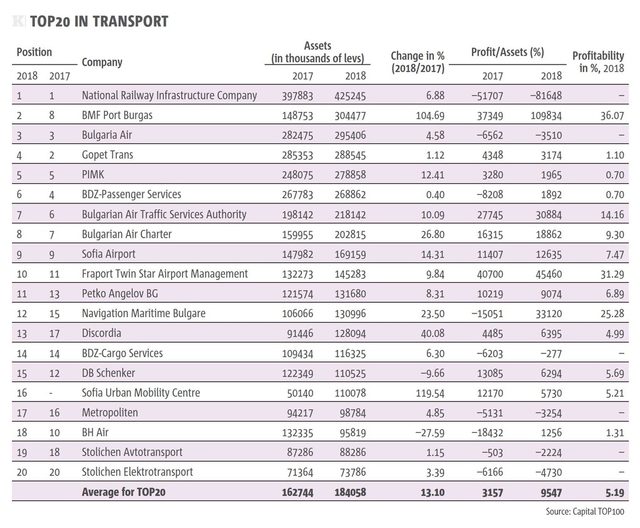- The ranking's leader - state-owned National Railway Infrastructure Company - is also its worst performer with losses of 82 million levs
Several developments pivotal to the transportation sector are in the offing. One is the upcoming concession of Sofia Airport. Another is the ever growing role of private seaports at the expense of their state-operated peers. Negative developments surrounding the EU's Mobility Package legislation, which intends to curtail competition in road haulage from Eastern Europe, and the establishment of a toll network in Bulgaria that will increase expenses on the domestic market, are also a concern.
In the context of these substantive changes, the effects of which are yet to hit business, 2018 was a decent year for the transportation sector. Most big companies in the sector grew their revenue by an average of 13%. The year was profitable too, and aside from the state-owned railways and the municipal transportation companies only flag carrier Bulgaria Air finished the year at a loss.
It comes as no surprise that the losses of state-owned National Railway Infrastructure Company, responsible for the railway network and train stations in the country, increased to a substantial 81.6 million levs. There was also a reshuffle among the Top 3, as the Port of Burgas concessionaire rose to second position, displacing last year's runner-up, the road haulage company Gopet Trans, down to fourth.
The big leap
The company with the largest revenue growth in the 2018 transportation sector ranking is the concession holder at the Port of Burgas - BMF Port Burgas, owned by the Domuschiev brothers Kiril and Georgi. The 105% increase propelled the company from 8th to 2nd place. It can also boast of having the highest profit increase - by 26% to nearly 110 million levs.
BMF Port Burgas was awarded the concession contract for the Port of Burgas in 2012 and since 2013 the company has operated the bulk cargo terminal Burgas East-2 and the container docks at Burgas West. The initial deal was helped by the privatization of national maritime shipping company Navigation Maritime Bulgare by the Domuschiev brothers. While sea shipping presented some challenges, the port operation business seems a lot more promising.
This left the adjacent state-run operator Port of Burgas with severely limited business options and the same is about to happen to its Varna peer to the benefit of the port serving Ahmed Dogan's Varna Power Plant.
However, the big revenue jump is down to the one-off effect of the introduction of new accounting practices and the completion of a large infrastructure project classified as income, company representatives explained. The total amount invested since 2012 exceeds 30 million euro.
As for the profit, the company attributes the result to a one-off event. The average increase in freight for the last three years was 12%, while in structural terms liquid cargo prevailed as a new business opportunity emerged, namely sulfuric acid.
The liquid fuel dock at the Port of Burgas attracted public attention recently after the now former CEO of Lukoil Bulgaria Valentin Zlatev announced that local fuel trader Insa Oil is the main client of the concession holder, suggesting that the company evades customs controls. Additional investments were made in an installation for unloading liquefied LPG, a grain silo, etc. According to Georgi Domuschiev, the bulk cargo terminal's largest client in 2017 was Aurubis Bulgaria. New facilities for processing and storing of copper concentrates were constructed for the needs of the Pirdop-based copper plant at a cost of 15 million euro. A further 14 million euro investment went into the construction of a sulfuric acid processing and storage plant. The investments were made by the concessionaire and the copper plant has guaranteed a freight minimum for at least 20 years.
BMF Port Burgas announced in the summer of last year that it has completed and put into operation a new logistical base, which will receive, store and then ship forward equipment for oil fields in Kazakhstan.
The company expects that 2019 will bring a moderate increase in freight to the order of about 5%, which is unlikely to affect the company's revenue or profitability.
The fastest growing on the road
In spite of all the current and expected transformations in the truck transportation subsector, the companies in it have not lacked the initiative to expand and make extensive investment plans. Discordia is a distinguished example from 2018. Its 128 million lev revenue represented a 40% increase. At the end of last year, the owner and CEO of Discordia Hristo Hristov declared in an interview for Capital that the company plans to become the Eastern European leader and increase its truck fleet to 1380 vehicles by 2022. At the time, the company operated 535. The company has planned to invest 350 million euros in the next five years to achieve that goal. About six months later the company announced that the project is going according to plan and its fleet has expanded to 600 Euro 6 trucks, with a further 180 modern trucks scheduled to arrive by the end of 2019. The projections for 2022 have gone up as well and they now expect to be operating 1400 vehicles by that time.
The two large transportation companies from Plovdiv - PIMK and Petko Angelov BG, reported revenue growth as well, of 12.4% and 8.3%, respectively. At the end of 2018 PIMK purchased an additional 50 trailers for its fleet of over 1400 trucks. However, the company and its partner Trakia Industrial Zone were unable to win the concession contract for Plovdiv Airport. When the winner of the contract, the Chinese HNA Airport Group, refused to enter into it, the government discontinued the procedure instead of awarding the concession to the second placed candidates from Plovdiv.
Ascent in the air too
2018 was a good year for most companies in the aviation transport sector as well (except the charter carrier BH Air). This comes as no surprise since there was a significant surge in tourist visits both to the Black Sea coast and Sofia. The state-operated Bulgarian Air Traffic Services Authority increased its revenue by 10% and they expect this trend to continue as the new mega airport in Istanbul will increase air traffic over Bulgarian territory. Sofia Airport's income increased by 14.3%, reaching nearly 170 million levs. In terms of the number of passengers, Sofia Airport was only 38 000 passengers short of crossing the 7 million mark. Its operations generated a profit of 12.6 million levs. Sofia Airport is currently choosing the concessionaire to manage it for the next 35 years, a process that has now gone to appeal. Surprisingly, a consortium of Meridiam and Strabag was declared the winner and awarded the concession. The winner submitted the lowest investment offer which made the other participants in the tender file appeals.
One of the appellants is the operator of the Frankfurt Airport, Fraport, the concessionaire (through the joint venture company Fraport Twin Star Airport Management) of the Bulgarian coastal airports in Varna and Burgas. The German company owns 60% and its Bulgarian partner BM Star from the Chimimport group holds the remainder. 2018 was a record year in terms of the number of passengers flown by low cost and charter companies. The two Black Sea airports serviced 5.5 million passengers in 38 000 flights, operated by 103 airlines. The company Bulgaria Air Charter is a good example - it increased its revenue by 26.8% to almost 203 million levs.
At the end of March 2018, low cost carrier Ryanair launched flights to Burgas airport on 11 routes, which provided 1200 takeoffs and landings to the facility. The airline planned to maintain at least two destinations open year-round and would have in exchange received assistance from a joint Bulgarian municipal fund created for this purpose. One year later, however, the picture does not seem as rosy. For reasons unknown, Ryanair has closed its base in Burgas and only kept three summer destinations open - Krakow, Warsaw and Bratislava.
The national carrier Bulgaria Air performed slightly better, reporting a scant increase in revenue and smaller losses. Nonetheless, the company received good news from court in regard to its legal battle with Sofia Airport over unpaid airport tolls.

- The ranking's leader - state-owned National Railway Infrastructure Company - is also its worst performer with losses of 82 million levs
Several developments pivotal to the transportation sector are in the offing. One is the upcoming concession of Sofia Airport. Another is the ever growing role of private seaports at the expense of their state-operated peers. Negative developments surrounding the EU's Mobility Package legislation, which intends to curtail competition in road haulage from Eastern Europe, and the establishment of a toll network in Bulgaria that will increase expenses on the domestic market, are also a concern.












